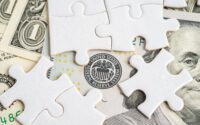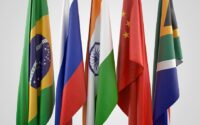DAVOS, Switzerland – For more than half a century, the world’s richest and most powerful have taken refuge in this dazzling ski town where they could mostly agree on one thing: that globalization is good – for countries, corporations and people.
The Davos elite is reassessing globalization amid pandemic and war turmoil
Verdict: It’s complicated. But signs of a changing world order and fears about exactly where things will land permeated the five-day conference and numerous dinners full of champagne.
“There is great concern about globalization this year,” said Jason Furman, an economist at Harvard University and a former Obama adviser. “I mean, there’s always anxiety about globalization, but the big question this year is: how do you get out of all this? What is the end of quarantine in China? Or the Russian invasion of Ukraine? When will inflation disappear? There are no obvious deviations for any of these problems. “
The antithesis to global unity – the war in Ukraine – took center stage even as Davos audiences spoke about longer-term issues such as climate change, sustainability and the importance of education. In a virtual address, Ukrainian President Volodymyr Zelensky called for “maximum” sanctions on Russia and called on foreign companies to move operations to Ukraine instead.
“Davos is in Europe, and Europe is at war,” said Ian Bremmer, founder of the Eurasia Group and a longtime participant in the conference. “That made Davos very relevant this year. It’s now, it’s now: we have to end this war. “
At the same time, he and others said, the World Economic Forum is grappling with a much bigger identity crisis: What does it mean to represent the global interdependence of trade and investment at a time when countries have built new walls and renegotiated their alliances?
Russian diplomats and oligarchs, who have had a large presence in Davos for a long time, are banned from attending this year. Instead, the long-running “Russian House”, known for its free vodka and caviar, has been turned into a “Russian House of War Crimes” full of pictures and videos of war crimes.
Meanwhile, China – the world’s second-largest economy – was also largely absent from the forum due to major closures and travel restrictions related to its “zero kovid” policy. After years of rapid growth, its economy is showing alarming signs of slowing. The companies are also talking about relocating operations from China to other countries, including Vietnam, India and Mexico.
“After the extraordinary events of the last two years, the focus is now on repurchases, close purchases, trying to ensure you have sources of supply around the world,” said Paul Knopp, CEO of accounting and consulting firm KPMG. “The global pandemic – which I don’t think many of us have seen coming – has provided some real lessons about supply chain shocks.”
Rethinking globalization comes amid greater reaction against the global elite – especially the rich, who have seen their wealth skyrocket during a pandemic, even as millions around the world have fallen into poverty. About 657 million people now live in extreme poverty, up from 641 million two years ago, according to World Bank projections.
“Many people are fed up,” said Bremmer, author of We Against Them: The Failure of Globalization. “You see it with illiberal trends, the rise of China, Bolsonar in Brazil, Duterte in the Philippines and vigilant leftists in the United States. All these things are not a reaction to the global elites in the last 50 years, in which the WEF has played a very strong role. “
While it is clear that global dynamics are changing, the momentum of decades of interconnected growth is only increasing. According to the United Nations Conference on Trade and Development, a record $ 28.5 trillion worth of goods were traded worldwide last year.
“Globalization has actually lifted a billion people out of poverty – and it is currently caught in what I call the perfect storm of three C’s: covid, climate change, conflict,” Pamela Coke-Hamilton, executive director of the International Trade Center, told the session. “Each of them can deal a physical blow to globalization. But the facts do not speak in favor. “
Meanwhile, many companies are struggling to find new suppliers and manufacturers who can continue to move products even if there is a closure or shortage in one country. And unlike in the past, executives say they are increasingly willing to increase production or purchase additional products – even if it means paying more.
Toy giant MGA Entertainment, which has been producing popular brands such as LOL Surprise and Bratz in China for years, recently opened two factories in Mexico, with plans for a third in the coming months. It is also moving part of its production to India. After two years of delays and rising costs, CEO Isaac Larian said it pays to pay more for production elsewhere.
“With so many closed Chinese cities, we just didn’t know when we were going to get something,” Larian told The Post. “Factories could not get labor, prices were rising and provinces were closing. In the end we said, ‘You know what, we have to try something new. It doesn’t have to be just China. ‘ ”
Some economists worry that reorganizing production and trade could reverse decades of progress.
“There is a real danger of globalization receding,” said Beata Javorczyk, chief economist at the European Bank for Reconstruction and Development. “Business companies are particularly concerned because it would be very easy to use the current situation to raise trade barriers in the name of building resilience.”
But the mood in Davos was not very gloomy. Many business owners said they remained optimistic, even facing crises, including a slowdown in the economy and rapidly rising inflation. This moment of international concern, they argued, would be short-lived.
“Globalization is not a good thing; it’s a great thing, ”said Loic Tassel, president of Procter & Gamble’s European operations, at the session. “We come to the question, is it moving, is it pausing? I think it’s a temporary break. It is our responsibility as a leader to continue to ensure that globalization continues to thrive, not because it is in the interests of companies – which would be right anyway – but because it is in the core interest of consumers. ”
Even with globalization on hold – either unfolding or perfectly intact, depending on the view – the joy in Davos continued after hours. Salesforce billionaire Marc Benioff opened a barrel of sake on stage at a Time magazine party. The electronic music duo Chainsmokers performed at the Cloudflare event. And Anthony Scaramucci hosted his annual extravaganza of wine tasting in such a crowded space that even former House Speaker Paul D. Ryan was forced to wait in line in front.
“I realized that if you buy expensive wine, people show up,” said Scaramucci, a hedge fund manager, perhaps best known for his 11-day tenure as communications director of President Donald Trump. “Davos is still relevant and valuable.”
[ad_2]
Source link


